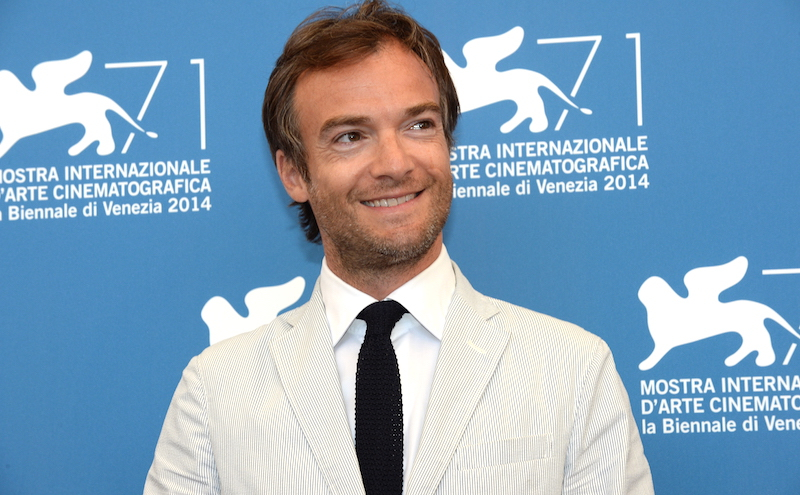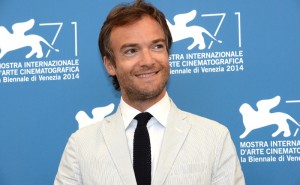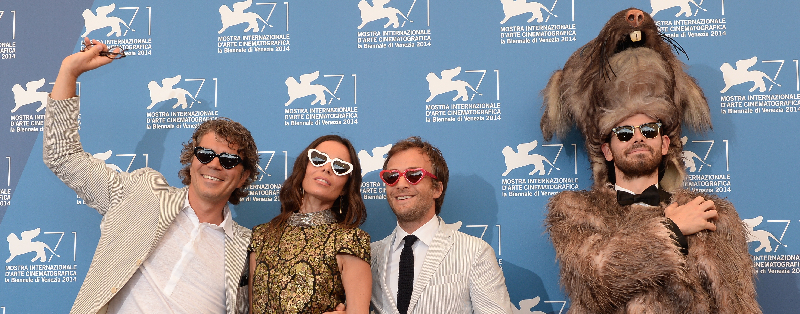Venice Film Festival 2014: Interview with the cast and producer of Reality

After the unveiling of Quentin Dupieux’s Reality, The Upcoming interviewed actors Jonathan Lambert and Élodie Bouchez and producer Grégory Bernard at the 71st Venice Film Festival.
How was working with Quentin again?
Jonathan Lambert: Quite the same as the first time; of course, the first time we met together we were talking about our references and the things we had in common about humour and cinema. We agreed that David Lynch’s movies are funny first, so we think about the same things, and that’s what I like in his movies: they are not common, they are not constructed like basic comedies with very strict cut editing and sound design and fast situations. There’s something really calm, sometimes uneasy, and starting from these things that are not typical comedy he makes us laugh – I mean, he makes me laugh. That’s what I like, you see, because he’s making movies that are very weird but very funny.
Was today’s screening the first time you saw the movie in its entirety?
JL: No, no, we saw it because we had some questions to answer before the screening but it’s better the second time because everything is so blurred between the reality and the dream and you don’t know when you are losing the reality, so the second time is better, because sometimes you’re trying to capture the moment where you’re not in reality, but in vain, because the film is built like this. You can’t say when it is reality and when i’s not.
Back during the press conference of Inland Empire here in Venice, Jeremy Irons said he didn’t understand what was happening whilst filming. How was it for you on the set of Reality? Did you understand what was going on?
JL: Usually we never understand where we are going in any movies
Élodie Bouchez: No!
JL: With Quentin, we know there’s always something particular with the comedy, which is that you’re never sure if it’s going to be funny. I trust him because sometimes I’m coming from one-man-shows and TV shows so I’m trying to make more because I’m not sure how to be funny, but the situation alone is really enough to make the audience laugh, so sometimes he came to me and said “just play the role and be yourself” and that’s it. I trust him for that.
How was the script – was it detailed?
Grégory Bernard: Quentin always shoots the script; he knows exactly what’s going to be shot and he doesn’t hide anything from the public.
 Is Quentin open to changes on set? Or is he very meticulous?
Is Quentin open to changes on set? Or is he very meticulous?
GB: He’s open to changes on set, but he doesn’t change that much.
EB: He doesn’t need to.
GB: It’s very rare that he does something new in the editing or adds something; if he does add to what he wrote, it’s very small, so the actors basically know what they’re going to shoot from the moment they read the script. For all the films that he did, he basically just shot the script, including Reality.
Is it easier for the actors to have a very detailed script so that you just have to learn the lines and not worry about changes?
EB: It really depends on the movie and on the director you work with. I like the idea of adapting myself to the director’s method, so whatever his direction style, I just follow his flow, if I trust him.
I know you’re a French team, but I saw the movie in English. Was there a discussion about the language? Did you consider doing it in English all the way so that it would be easier to distribute abroad or did you decide: we are French and this movie is going to be in French even if it’s set in the US.
GB: Originally it was supposed to be shot in France and in French, but we decided to shoot it in the US for production reasons.
JL: Even in South Korea!
GB: In the first movie [version] the little girl is Korean so we had plans to do a co-production in Korea. Then we did a fully French movie and we were getting ready to shoot in France when we decided to go to the US to shoot it. This is when the idea of making a bilingual movie and mixing American actors with French actors came up with Quentin. What really struck me when I watched the movie today was that it was completely natural. At no moment in the movie was it like, “Okay she’s French, but she lives in America, and he’s French but he speaks English…” everything was very clear. I think it was shot the way it should have been shot.
Am I right in thinking that it was shot two years ago, more or less?
EB: October…
JL: Yes, 22 months.
In terms of distribution, were you waiting for the right moment to present the movie to festivals and distributors?
GB: We only just finished the movie. As soon as we got it finished we got the proposition from Venice and the movie will be released at the end of February in France – I think it’s sold to Germany too, and we’ll have to see if it’s distributed in the US, but I hope to get a release at the same time in different countries.
Hopefully the UK as well!
JL: And Monaco… we are working on it
Why was Phillip Glass chosen for the soundtrack?
GB: Quentin really likes Philip Glass; he’s been very hands-on with the music in the past films. He gets into the music and he wanted to do a score that wasn’t his own score, and so he wanted to do it with Philip Glass. It’s the same Glass track that follows the whole movie and it’s a different way of considering music in a movie. The movie in the music is minimalistic; it’s not using music for big effect.
It gives a lot of rhythm to the film. I’m a Philip Glass fan but I didn’t know this one.
GB: It’s a Philip Glass track from the 70s, an unreleased track. It’s an exclusive from the old days! Unedited.
What was the budget of the movie?
GB: Most of Quentin’ movies we shot for less than two million.
JL: We’re paid in flowers!
GB: We’re paid in flowers, yes, and this movie follows that tendency. The shoot itself was still on budget.
Why did you want to be part of the movie?
JL: Because I’m jobless! No, I worked on his first movie called Steak and in fact there is a story about that: first of all it was another actor who was supposed to play that role but there was a problem and I was available. It was very last minute and very cool because I really loved that script; as I said I actually read it like five years before when it was previously to be made in South Korea. I knew the movie was probably his best. It’s a sum-up of all his others – I believe his whole spirit is inside this movie so I really wanted to be part of it, but I had a one-man show and it wasn’t possible. Quentin called me and said, “the actor doing Bob Marshal cannot be there; we’ve had a problem. Can you be here in seven days?” So I rearranged my planning and came here – it was fantastic. It was incredible for me because like ten days before I didn’t know I’d be a part of the movie.
EB: For me, I’ve seen all of Quentin’s movies and I’m a big fan; I read the script and I loved it. It was one of those scripts that you read and for some reason, you know that you get the vibe. You know exactly what vision he has, and I wanted to be a part of this vision. I auditioned and he kindly gave me the part.
JL: For me, Quentin is building the humour of the third millennium because it’s so unusual all the way; he’s making comedy but as I said it’s not the usual coat you have in comedy.
I must watch his other movies as well because I’m curious about the way he works. Do we all agree that the cinematography is amazing?
JL: We agree! He does it alone. There’s no post-production, there’s nothing. Just the camera and the sun.
It’s perfect for this kind of movie; it’s exactly how you want it to be. Did you expect it to be so beautiful?
GB: It’s my fourth movie with Quentin, but he used a new camera. He did two and a half movies with the 5D but I know he can do anything with a camera and the sun. He can get the best out of it – a quality that nobody else can get. He doesn’t even have to make any kind of change in post-production. It’s really one of the crazy things you get from working with Quentin: he gets beautiful cinematography.
GB: Once again, it’s very rare to work on the aesthetics and the way you’re going to film the light; the sun isn’t usually the priority, the priority is usually directing the actors and the text. Of course there is the cinematography, but it’s rare for a comedy to prioritise it.
Last question, what was your favourite moment in the movie?
EB: For me it’s the very long scene where they meet and talk about the project of the movie. It’s such a great scene. I love that it takes so long and that it’s so funny. The rhythm is just perfect.
JL: I love that Eric Wareheim, who is playing my secretary, comes from nowhere! My wife asked me, “is he German? is he American?” The way he speaks in French is very funny; there’s something very unique about him. He’s like one of the little dolls in The Thunderbirds.
GB: I’d have to go for the dialogue as well. I also really like the last part of the movie, the last ten minutes where you have a slow acceleration; it’s like acceleration and deceleration at the same time – it’s very strange the way he deals with the rhythm at this point. You can feel the tension is getting bigger but at the same time, the scene is very slow. There are lots of new elements coming in so it’s very unusual and disturbing.
Filippo L’Astorina, the Editor
Read our review of Reality here.
Read all our Venice Film Festival 2014 reviews and interviews here
























Facebook
Twitter
Instagram
YouTube
RSS